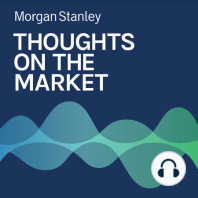3 min listen

Jonathan Garner: Volatility in Asia and Emerging Markets
Jonathan Garner: Volatility in Asia and Emerging Markets
ratings:
Length:
3 minutes
Released:
Sep 28, 2023
Format:
Podcast episode
Description
With volatility in Asia and emerging markets causing both upswings and downswings, certain markets will be critical as uncertainty continues.----- Transcript -----Welcome to Thoughts on the Market. I'm Jonathan Garner, Morgan Stanley's Chief Asia and Emerging Market Equity Strategist. Along with my colleagues, bringing you a variety of perspectives, today I'll be discussing why we turned more cautious on our coverage recently. It's Thursday, September the 28th at 9 a.m. in Singapore. We turned more cautious on our coverage in early August, downgrading Taiwan and China to equal weight and Australia to underweight, whilst raising India, which we view as defensive, to a major overweight. For India, multi-polar world trends are supporting a surge in inward foreign direct investment in manufacturing, and portfolio flows into both bonds and equities. The country's reforms and macro stability agenda, particularly in fiscal policy, is underpinning a strong capital expenditure and profits outlook. We also maintain Japan equities, currency hedged, as our top pick in global equity markets. Japan has strong nominal GDP growth, positive earnings per share revisions and valuations which remain reasonable in our view, at a little over 14x forward price to earnings. However, the continued debate on China's growth slowdown and now a sudden further rise in US real yields are, in our view, likely to pressure markets lower generally, in what is seasonally a difficult period for our asset class. Volatility is now and generally has been a feature of Asia and emerging equity markets. Hence the intense interest in market timing and hedging strategies in an asset class which has, with the recent exception of Japan, failed to deliver attractive, sustained compound returns for the US-dollar-based investor. Indeed, we've made the point before that on a risk adjusted basis, Asia and emerging equity markets are what is known as Sharpe ratio inefficient in a multi asset sense, that is returns have not compensated for volatility compared to other benchmarks.All of our coverage markets have higher volatility than the S&P 500, and in many cases significantly so. In particular, China A shares, the Hang Seng China Enterprise Index and until recently, the India benchmark Sensex. In terms of why this is the case it probably has to do with the following characteristics. Firstly, more volatility in earnings cycles. Secondly, less developed domestic institutional investor bases than in many developed markets. And thirdly, greater reliance on foreign flows, which are inherently less sticky than domestic flows. However, this is changing now for the India market. Combining data allows us to develop a simple scoring framework to assess complacency versus fear in relation to drawdown risk. It suggests a somewhat complacent mode in general, but particularly for China A, Australian equities, that's the ASX 200, and the overall MSCI EM benchmark, much less so for Topix, Nikkei and the Hang Seng Index. And this reinforces our view that Japan equities are a key holding to maintain currently. Thanks for listening. If you enjoyed the show, please leave us a review on Apple Podcasts, and share Thoughts on the Market with a friend or colleague today.
Released:
Sep 28, 2023
Format:
Podcast episode
Titles in the series (100)
Mike Wilson: 3 Summer Surprises Investors Could Be Missing by Thoughts on the Market